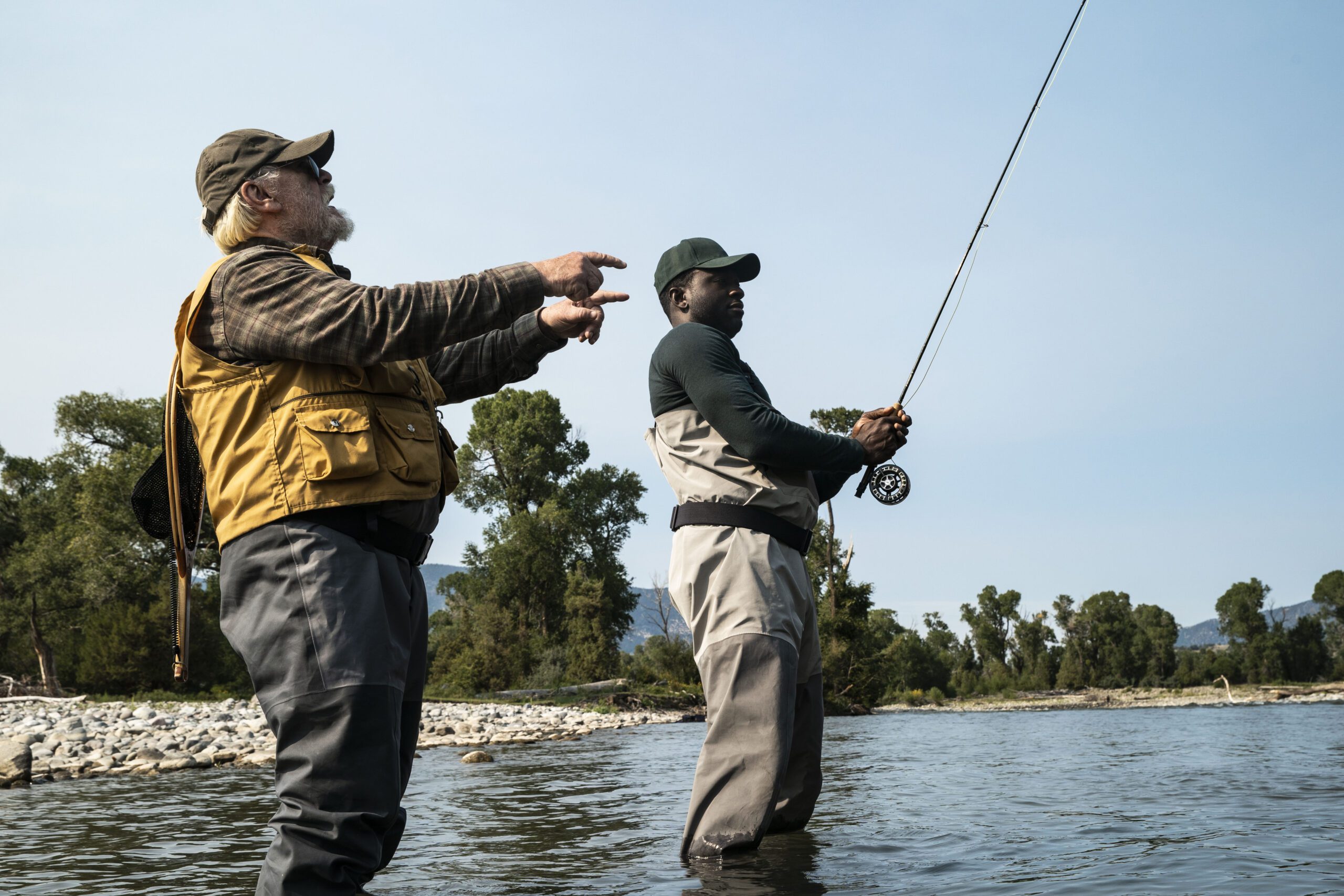‘Mending the Line’ opens June 8, premiere event benefits Warriors & Quiet Waters Foundation
By Jack Reaney STAFF WRITER
A feature film depicting two anglers as they wade into solace from military trauma will premiere in Bozeman, with proceeds benefiting an organization which shares the same mission.
Based in Bozeman, Warriors & Quiet Waters brings post-9/11 combat veterans on fishing and outdoor trips in Montana. The nonprofit was co-founded by a Vietnam veteran and doctor in 2007. “Mending the Line,” filmed and set in Montana, shows the impact of an outdoor pastime like fly-fishing on veterans reintegrating into non-military life. The film will premiere in Bozeman on Thursday, June 8 at 7 p.m. at the Crawford Theater of the Emerson Center for the Arts and Culture.
Beginning at 6 p.m., the Bozeman Film Society will host a social and raffle to benefit Warriors & Quiet Waters. A variety of fly-fishing and river gear will be raffled off.
The Montana-made film “is a careful, thoughtful look at the effects of PTSD that also manages to make wider points about how we heal,” according to a review by film critic Eddie Harrison. The movie won the Valor Award at the 2022 San Diego International Film Festival.
The film’s press release offers a brief preview of the film, which takes place in Livingston:
Brian Cox, an award-winning actor known recently for his role in HBO’s ‘Succession,’ stars as Ike Fletcher, a “surly, headstrong fly-fisherman” and Vietnam War veteran. Fletcher meets John Colter, a wounded Marine who returns to the states “still carrying the demons of war,” played by Sinqua Walls. Colter and Fletcher bond over fly-fishing and cross paths with Lucy, a photographer and librarian who reads to veterans, played by Perry Mattfeld.
“While getting treatment for his wounds, both physical and psychological, Colter wants only to re-enlist, to have something to die for. But the real challenge is finding something to live for,” the release states.
The film was written and produced by Bozeman resident Stephen Camelio, during his time working at a bookshop in Yellowstone National Park around 2009.
Many scenes were shot in Montana, featuring the Angler’s West fly shop on the Yellowstone River in Emigrant and a fishing montage on the private DePuys Spring Creek in Livingston. Fletcher and Colter’s opening and closing fishing scenes were shot on the Gallatin River, in the exact spot where “old Norman” fishes alone at the conclusion of “A River Runs Through It”—the location was chosen for its beauty and in homage to the 1992 film, according to documents from “Mending the Line.”

Scenes depicting overseas combat were filmed at the US Marine Corps Base Camp Pendleton in Oceanside, California.
After the premiere, Bozeman Film Society will host a panel featuring Camelio, Warriors & Quiet Waters staff member, alumni and film cameo Larry Weidinger, and fisheries biologist Joe Urbani.
“We are excited to bring the Montana Premiere to the Emerson Crawford Theater and support the amazing work that Warriors & Quiet Waters Foundation provides to our veterans,” wrote Lisa McGregory, executive director of the Bozeman Film Society, in an email to EBS.
Although Camelio was unable to speak with EBS due to the ongoing Writer’s Guild of America strike, he wrote a screenwriter’s statement about the film before the strike began.
Camelio’s father volunteered to fight in Vietnam, and was later diagnosed with a rare form of cancer linked to Agent Orange exposure. Camelio writes that his father inspired the teaching aspect portrayed in the film.
“As an avid angler who was at the time writing for many fishing publications, during my father’s battle with cancer and after his passing in 2013, I often took solace on the rivers of Yellowstone National Park and Montana,” Camelio wrote. “As every fly fisherman knows, there are few things as therapeutic as standing in cool, moving water accompanied only by the rhythm of a fly rod and the possibility of a rising fish. It was during these forays into the outdoors that I experienced the healing power of fly fishing. Through these experiences I also came up with the story that would become MENDING THE LINE.”
The film was directed by Joshua Caldwell of upstate New York, who came highly recommended for his passion for fly-fishing in the Catskill Mountains, and his interest in telling stories related to post-traumatic stress disorder.
Camelio wrote that it was a conscious decision to set the film in his adopted home state of Montana. He sought to bring his personal experience to the script “while capturing the essence of Montana’s wild places that captivate all who immerse themselves in them,” he wrote. In doing so, he added, “I have come to realize it is no longer my story.
“Everyone involved with the film has turned it into a universal tale of resilience and redemption, and in doing so they’ve created a moving example of how to start the healing process much like I did on the water many years ago,” Camelio concluded.












